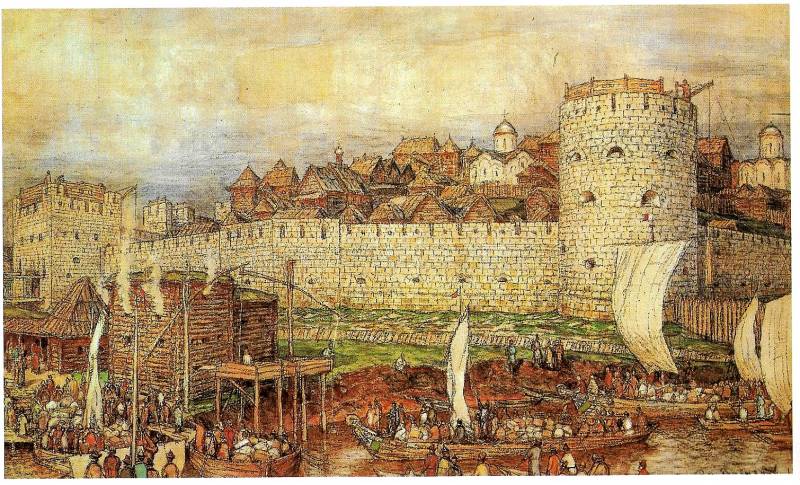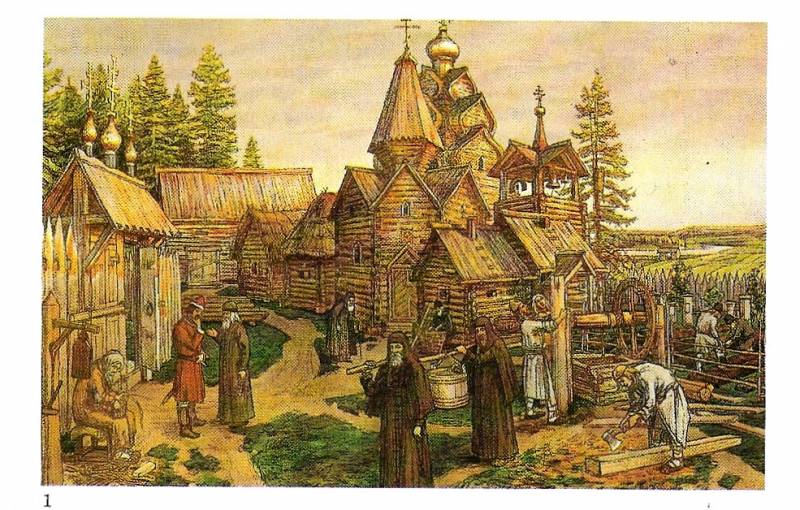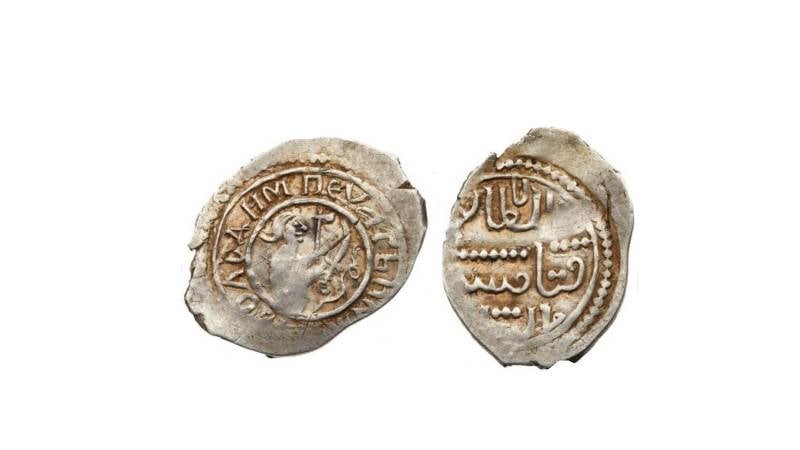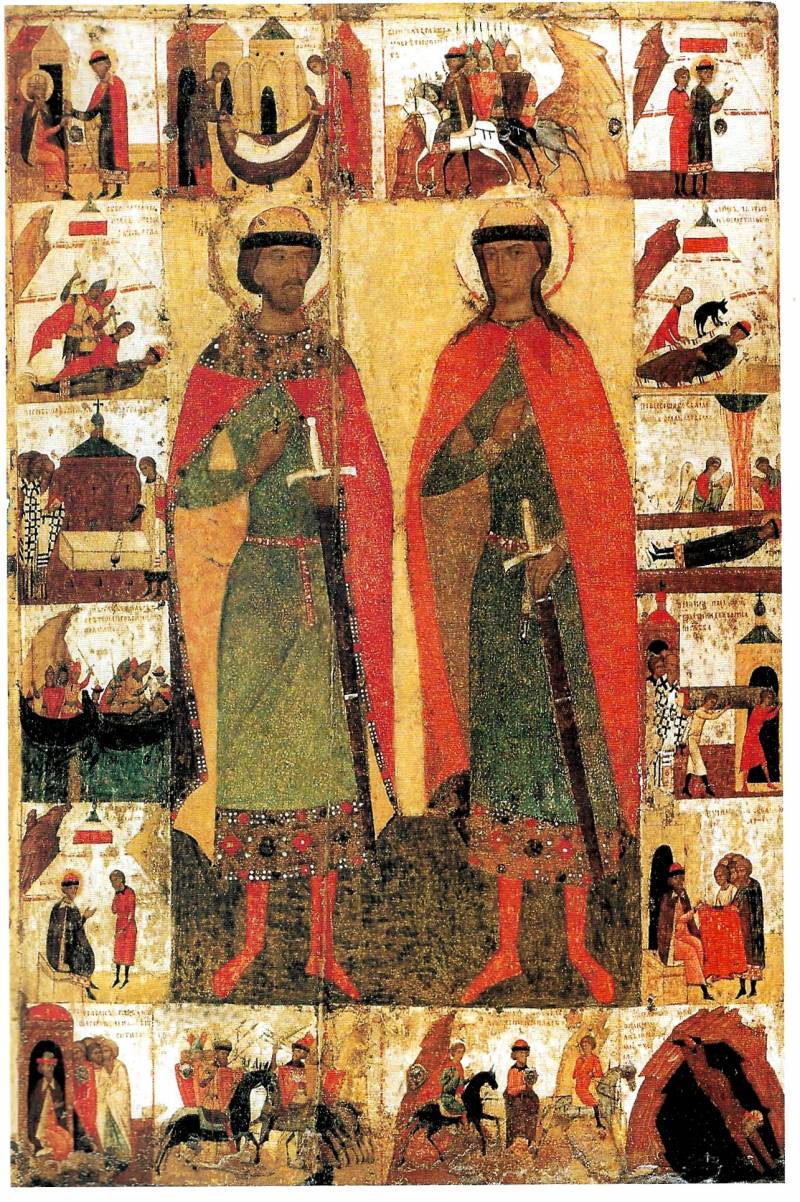How the state began in Rus'

White-stone Moscow of Dmitry Donskoy. Hood. A. Vasnetsov. 1922
After the military-political catastrophe of the XNUMXth century, the question arose of who would have the supreme power in the Russian lands? Or who will lead the forces to overcome the situation that has developed after the Mongol invasion? The choice was made by an external force standing outside the structure of the country. The Mongol-Tatars, based on their understanding of the world order, saw in the Russian princes who came to the Horde, not representatives, but rulers of the "Lands".
This made it possible for the princes to behave in a completely different way with the zemstvo or volost.
Previously, it was the “Earth”, in the face of direct “primitive democracy”, that dominated or stood next to the power of the prince. Now, with the shift of the center of power, the “king” of the Horde, and not the community of the “Earth” becomes the source of power for the prince: Whoever has the power has the power. Therefore, within a short period, the "executive" princely power turns into the supreme. On the one hand, such a situation can be regarded as a usurpation, but on the other hand, it was historically natural.
Rus' could get rid of the yoke only with military forces no less than those of the Horde, the land or city-state with its divergent interests and city militia would never be able to unite. To solve this problem, it was necessary to concentrate all the forces of the so far sovereign Russian "Lands", without which the existence of Rus' as an independent subject stories it would be impossible. And the collection of forces capable of resisting the steppe Horde could only go through the capture or unification of these "Lands".
This is not the way to create a centralized state, as many have read about in textbooks and books. It was just a way to create a state or an early state, in the truest sense of the word, which did not yet exist in Rus' in the XNUMXth century: there was not even a term that defined it.
The weakening and then the fall of direct democracy and people's rule in Rus' was associated with the defeat of the city as an economic and political center by the Tatar-Mongols. The Horde undermined the economic foundations of the fragile agrarian economy of Rus', levying an inadequate, economically unjustified tribute - "an inevitable tribute." Undermined the economic foundations of the country, located in the zone of risky agriculture.
I would like to emphasize that more than one "Earth" alone could not resist the constant military threat from the Horde in military-technical terms.
Otherwise, all citizens had to be engaged not in economic activities (tillage, crafts and trade), but to be a permanent garrison, which is impossible to imagine in an agrarian society. Because of these reasons and under such conditions, there was an organic transfer of the functions of defense and diplomatic settlements to the princely power, which, in the process of solving these problems, became the supreme power.
In the Frankish state in the VIII-IX centuries. the free Franks who settled on the ground did not want, and could not, participate because of the increasing role of the warrior-rider in endless external wars. What caused the need to change the military structure, the basis of which was not a foot soldier-militia, but a warrior-rider, who was provided by his master. Which in turn led to a change in the entire structure of society, where the former leaders of the tribes, the dukes, passed into the category of service people of the king and his deputies in the field. Such changes generally led to the formation of an early, service state among the Franks, the pinnacle of which was the "empire" of Charlemagne (742-814).
Transition to a new management system
A natural process is taking place when the old form of social management dies out, unable to cope with external challenges. And the transition from city-states to a united military-service state is being carried out. And all this, within the framework of the communal-territorial structure both in northeastern Rus' and in the Grand Duchy of Lithuania. Until the XNUMXth century in Rus' there was neither a professional proto-bureaucracy, nor a systemic written fixation of managerial actions, that is, attributes of the beginning of the development of the state.
The princely court as a state model
But at the end of the XNUMXth century, the question was about an adequate system of government that could cope with current problems. Naturally, there were no algorithms for its construction on hand, the whole process took place by trial and error, but all the states of Europe that arose on the site of the “barbarian kingdoms” were formed in the same way. Except for the details, the whole process was similar.
Instead of a spontaneous assembly-veche, the princely court became the basis of this system. Moscow began as this same courtyard.
At the head of a house or court in Rus' was the owner - the sovereign or ruler. "The Lord of All Rus'", as they wrote on the coins of the Grand Dukes. And the princely court differed from the court of any wealthy husband only in scale and rich decoration, but its system was completely similar.
On the one hand, it's just a yard with a house, in the most ordinary sense of the word. The state is built like a house, wrote Hobbes.
On the other hand, the “yard” is the palace army or the army of the prince himself, any prince or boyar, the former squad.
The sovereign's court was mentioned for the first time in the annals in 1405, and the actual term "principality" in the sense of "state" first appeared in the annals in the XNUMXth century in the west of Rus', and in the northeast - only in the XNUMXth century.
If earlier the prince, a certain nomadic leader, could withdraw and leave the volost, in 1224 Prince Vsevolod leaves Novgorod “with all his court”, Alexander Nevsky in 1241 “with his mother, wife and with his whole court”, now the rooting of the prince on earth takes place.
The court or “state” became the basis of the emerging system of governing the country, and this system itself received the name of the owner of this court - the sovereign, the ruler. She bears this name to this day.
The system of the court-state of the Grand Duke gradually spread over the course of almost three centuries to all subject communities or cities-“lands”, devoid of a political component, but having self-government. Power in this period is not power over territories, but power over people.
We observe absolutely the same evolution in management in Western Europe, which is at the pre-feudal stage of development, the period of the neighboring community. Like the court of the Moscow prince of the XIV-XV centuries, the court (curtis) of the Frankish kings in the VIII-IX centuries, including Charlemagne (742-814), looked like. Majordom (major domus), the eldest in the house - an analogue of the Russian butler, who was in charge of the estates and the house. The constable is the head of the stables, the head of the marshals (grooms), the seneschal (senexscalcus) is literally the senior slave responsible for the entire economy, the Old Russian key keeper, also of slave status. Falconarius - falconer, responsible for hunting. The cameraman was responsible for the treasury and wardrobe. It was from the positions of the court that the “state” positions that have survived to this day grew, their similar names were used throughout Rus': equestrian, bed attendant, steward.
All the inhabitants of the court were servants of the master, both "military personnel" and "service personnel", relationships were built solely on the principle of personal devotion. Within the lack of clear divisions of administration, interchangeability was present.
The "state" or earlier the state, the proto-state in medieval Europe, in contrast to Antiquity, arises where the service arises, and nothing else.
Gradually, with the spread of the court system to all Russian volosts, all the people were considered servants (subjects) of the prince, both under the Lithuanian and under the Tver, Yaroslavl, Moscow grand dukes.
All local management issues in the XIV and XV centuries. carried out by communities, princely power, having no bureaucratic apparatus, had nothing to do with them, with the exception of the highest court and criminal cases. At this time, the Russian prince was not yet the undivided ruler-monarch, but the sovereign-ruler.
So, Ivan Kalita (1288-1340) in his spiritual charter bequeathed to his sons only the cities he personally conquered. Vladimir, Pereyaslavl, Rostov, Uglich, Galich, Beloozero are not mentioned in the will.
In such conditions, the princes seek support in the best people of their court and city, known collectively as the boyars.
Boyars
In the pre-Mongol period, the princes entrusted the boyars with important tasks in the war and in government, the same thing happens in the XIV-XV centuries. Only, firstly, the range of tasks has grown significantly. Secondly, the prince becomes the supreme ruler, the source of power, and he wants to see servants in the boyars, as in all others in the "court", and not friends and comrades from the squad, as before. The boyars remain senior service people and “managers of all trades”: in war, in the princely palace, at feeding, in embassies, etc.
The institution of the boyars in different periods of history had different meanings: the boyars of the 1350th century are seriously different from the boyars of the 1389th century, although they had a common name. On his deathbed, Dmitry Donskoy (XNUMX–XNUMX) reproached the boyars:
In fact, the boyar administration was in his infancy, will be in the infancy of his grandson, Vasily II the Dark, etc.
Many princes, passing under the sovereignty of the Grand Duke of Rus', remain on their table, in their land, continuing to rule as sovereigns. However, the number of boyars, which included both princes and princes, relatives of the Grand Duke, was not large throughout the XNUMXth century, but with the growth of the lands of Moscow, it increased sharply by the end of the XNUMXth century.
At the beginning of the 1th century, only three boyars passed to Ivan Kalita, one of whom, who came from Kyiv, brought 700 people with him. On the Kulikovo field in 1380, 700 boyars and boyar children (the name of the future nobles) died from all Russian cities participating in the battle.
patrimony and land
As long as the ruling stratum in Kievan Rus received income from campaigns, tributes, duties and penalties, there was no need for landed property. Princely and boyar villages were a rare occurrence, islands in a sea of communities. In them, the slaves were not engaged in cultivating the land, but in the production of important attributes of prestige and war, breeding horses, hunting birds, etc. Boyar families only appear in the XNUMXth century, and their land holdings do not arise until the XNUMXth century.
Initially, a fiefdom is a movable and immovable inheritance from the father. Later - specific land ownership with the right to dispose of those living on the territory of the estate and receive income or rent from them. The patrimony arises only with the beginning of the disintegration of the community, when the land became the object of sale, which was furnished with a huge number of conventions. Estates appear in Rus' only at the end of the XIV century. The bulk of the land continued to belong to the community, which bore both the tax (internal taxes) and payments of Horde payments (indemnity).
And the first estate owners, both in Rus' and in Europe, were monasteries, which for a long time received "contributions for the rest of the soul" with lands and allotments. As part of the spiritual upsurge in Rus' in the XNUMXth century, after the crisis caused by the Mongol invasion, many monasteries arose in different principalities. Fear for one's soul forced, as documents show us, to give all their property to monasteries.

Ancient Russian monastery. Hood. A. Vasnetsov. End of the XNUMXth century
In the XNUMXth century, the process of granting and donating lands went more intensively, primarily due to wastelands, lands requiring development.
Secular estates were formed in different ways.
Firstly, these were the lands of specific princes, relatives of the Grand Duke.
Secondly, these are the lands of the princes who went into the service or fell under the authority of the Grand Dukes of Moscow. In order to destroy separatism, or for other reasons, the Grand Duke moved princes or boyars, for example Novgorod, from one land to another.
Thirdly, these were the lands that were received by the boyars and other courtyards - "nobles" who served the Grand Duke.
In Rus', it was not land that was given, but the rights that the Grand Duke himself possessed in relation to persons in the transferred territory were transferred. The land remained in the ownership of the community and community members, i.e., zemstvos. And the votchinnik received for himself what the Grand Duke or another previous owner of the land had previously received, nothing more.
Medieval Western European pre-feudal and feudal society did not know, unlike Rome, private property. Throughout this period, the farmer maintained a close, “intimate connection of the family group” with the land, the land was a continuation of the family, clan and farmer, and was not an object of sale: “The land feeds a person, but does not enrich him.”
In such a society, accumulation was condemned and condemned in every possible way. This does not mean that it did not exist, but the farmer was limited to satisfying physiological needs for procreation, to know - to acquire attributes of prestige. Not a single social group and class had full and undivided ownership of land, since land becomes a commodity only under capitalist relations.
It is characteristic that the purchase of a village or land in the Muscovite state was not yet a full-fledged act of sale and purchase and had signs of a pre-class system. The seller had the right to redeem the land after 40 years, and sometimes even after 100 years, at the sale price. Buying or receiving land for service with farmers, as in the XNUMXth century, was impossible.

Money of the specific prince Vladimir Serpukhov, a participant in the battle on the Kulikovo field.
All lands, whether owned or communal, were cultivated personally by free peasants. There was very little land that was cultivated by slaves.
In Rus', as earlier in Europe, the presence of wastelands and castles, "villages", encouraged votchinniki to attract farmers to their lands.
Personally free "black people" fell under the patronage of the patrimony, the church or a noble person. The peasant, who received protection from his "senior", the estate owner, was freed from the burdens placed on the volost or his churchyard, which his community actively opposed, bringing disputes to the court of the Grand Duke, about which we have many petitions.
Because the formation of patrimonial land ownership leads to the disintegration of the territorial community. The emergence and development of new forms of land use leads to an increase in the productivity of agricultural and commercial labor, and its early specialization and intensification takes place.
And this led to the strengthening of opportunities associated with the growth of the combat capability of the Russian army, a key element in the emergence of an independent state. The votchinniks were service people, therefore they were obliged to put up soldiers from the estates, while troops were not put up from the communal lands.
But ecclesiastical and secular estates had nothing to do with the feudal system. The votchina opposed the feudal estate and was liquidated in the process of feudalization. Because the estate was issued forever, and the estate - only for the period of service.
The beginning of the "estates"
The Russian population of the pre-Mongolian period was divided into free (the bulk) and not free. In the period under review, a division began along the socio-professional principle. There is a further division of labor, caused by the needs of the development of the economy, but above all military affairs.
Due to the Horde tribute and the loss of external income (tributes), ordinary community members began to pay more attention to agricultural labor, crafts and the development of handicrafts. More and more moving away from participation in the city army, they began to have fewer opportunities, and even less desire to participate in the direct management of the volost.
The same period was in Norway, during the time of the neighboring community and the formation of the state in the XNUMXth-XNUMXth centuries, when the power in the person of the king forced the bonds (free community members) to participate in the naval militia, forced them to participate in the tings (meetings of the free). Prior to this, both were the right and the will of a free bond. In conditions when the bond turned into an agricultural producer - a peasant, participation in direct management became a burdensome duty for him, distracting from economic concerns.
This process was natural, and under the conditions of the Tatar-Mongol yoke acquired some specific features. Under the pressure of nomad raids, migration and displacement of the population took place, which increased the category of semi-free people. The economic class of peasants is being formed, on the basis of free (black people) and semi-free (purchases, smerds).
In the XNUMXth century, Russian farmers, in the face of the weakening of the Tatar threat and the absence of pressure from the state, began intensive internal colonization and land development for agriculture.
Formation of the service structure
With the advent of a large military estate, there is no need for relationships with the people (townspeople) as a source of military strength, and an increase in the size of the state led to the fall of direct democracy, when everyone's participation in solving political issues became technically impossible. A citizen or community member could not combine labor and combat activities, and both labor required professionalism and concentration. Metropolitan Photius in 1425 ironically called the militias of the city of Galich people in "sheep's wool."

This is what Russian princes looked like in the XNUMXth century. Icon of St. Boris and Gleb. Second floor. XNUMXth century GTG. Photo of the author.
The constant military threat gives the right to the prince, both in the Grand Duchy of Rus' and in the Grand Duchy of Lithuania, now as supreme leader of the community, impute service to all personally free community members. They carry out auxiliary services, such as the construction and repair of fortifications and bridges, transport, support of the Yamskaya mail, escort of embassies, especially from the Horde. They fight in the militia, staff, as the forces of the "court" against numerous enemies were not enough. Now it is not independent townspeople who decide whether to convene the militia or not, now they are simply mobilized, as, for example, the forced conscription of ordinary citizens, the mob, in Novgorod during the outbreak of war with Moscow in 1471.
The entire population, and personally free in the first place, becomes conditionally serving, which, of course, was not in Rus' before the Mongol invasion: the prince of the community or city was not served. Due to the absence of a state apparatus, the communities of cities and volosts themselves lay out taxes, administer court and pay princely tiuns. That is, the territorial-communal system is preserved, but the "city-states" are being replaced by a military service state. This is not yet a class state, but its forerunner - the proto-state.
It was a transitional form that existed in Rus' from the XNUMXth century until about the beginning of the XNUMXth century. With the beginning of the genesis of feudalism in Russia-Rus, the military service state is transformed into a feudal state.
To be continued ...
Information